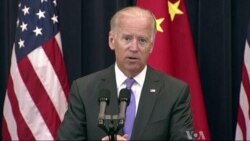U.S. and Chinese officials have agreed to restart negotiations on a bilateral investment treaty - a move hailed by Washington as a "significant breakthrough" that could expand Chinese market access for American investors.
Chinese Commerce Minister Gao Hucheng revealed the deal Thursday, on the sidelines of U.S.-China security and economic talks in Washington. Gao did not offer a specific date for the start of negotiations, but he said they will begin as soon as possible.
U.S. Treasury Secretary Jacob Lew praised the agreement, saying it marks the first time Beijing has agreed to negotiate a treaty covering "all sectors and stages of investment with another country."
China and the United States began treaty negotiations in 2008, under former president George W. Bush. But those talks stalled the following year, as President Barack Obama took office.
Beijing had only agreed to participate in the earlier treaty talks if Chinese service sector industries were exempt. U.S. officials say China dropped that demand during current negotiations.
Washington has pushed for such a treaty for years, with U.S. business leaders saying it would expand market access in a country where state-owned companies enjoy many competitive advantages.
A bilateral investment treaty would need approval by two-thirds of the U.S. Senate, where many members have been critical of China's widely perceived failures to curb cyber-espionage and protect U.S. intellectual property.
On Wednesday, U.S. Vice President Joe Biden called for China to stop what he called "outright" cyber theft, which experts say has cost the United States hundreds of billions of dollars a year.
China has denied the accusations, saying it is the victim and not the perpetrator of such attacks. It has become more outspoken on the issue since leaks by ex-U.S. spy agency contractor Edward Snowden revealed alleged widespread U.S. cyber espionage on Chinese and other targets.
Secretary Lew, speaking late Thursday, said China has committed to stronger protections for U.S. intellectual property and trade secrets. But he did not offer details.
Biden's Wednesday speech also addressed the sensitive topic of Chinese human rights. He said China will be stronger, more stable and more innovative if it respects international human rights norms.
U.S. officials said Secretary of State John Kerry was "very forceful" during private discussions on human rights, and raised "specific issues" with the Chinese delegation.
Chinese Commerce Minister Gao Hucheng revealed the deal Thursday, on the sidelines of U.S.-China security and economic talks in Washington. Gao did not offer a specific date for the start of negotiations, but he said they will begin as soon as possible.
U.S. Treasury Secretary Jacob Lew praised the agreement, saying it marks the first time Beijing has agreed to negotiate a treaty covering "all sectors and stages of investment with another country."
China and the United States began treaty negotiations in 2008, under former president George W. Bush. But those talks stalled the following year, as President Barack Obama took office.
Beijing had only agreed to participate in the earlier treaty talks if Chinese service sector industries were exempt. U.S. officials say China dropped that demand during current negotiations.
Washington has pushed for such a treaty for years, with U.S. business leaders saying it would expand market access in a country where state-owned companies enjoy many competitive advantages.
A bilateral investment treaty would need approval by two-thirds of the U.S. Senate, where many members have been critical of China's widely perceived failures to curb cyber-espionage and protect U.S. intellectual property.
On Wednesday, U.S. Vice President Joe Biden called for China to stop what he called "outright" cyber theft, which experts say has cost the United States hundreds of billions of dollars a year.
China has denied the accusations, saying it is the victim and not the perpetrator of such attacks. It has become more outspoken on the issue since leaks by ex-U.S. spy agency contractor Edward Snowden revealed alleged widespread U.S. cyber espionage on Chinese and other targets.
Secretary Lew, speaking late Thursday, said China has committed to stronger protections for U.S. intellectual property and trade secrets. But he did not offer details.
Biden's Wednesday speech also addressed the sensitive topic of Chinese human rights. He said China will be stronger, more stable and more innovative if it respects international human rights norms.
U.S. officials said Secretary of State John Kerry was "very forceful" during private discussions on human rights, and raised "specific issues" with the Chinese delegation.










